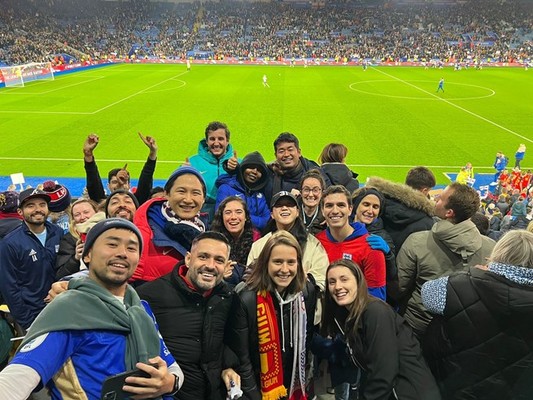
For the second month of the FIFA Master here at De Montfort University (DMU) in Leicester, October saw our new acquired knowledge put to the test through academic assessments such as a Wimbledon Group Presentation and essays linked to our sub-modules on the Birth of Modern Sport and Professional Sport in Context. We also got to see behind the scenes of renowned sporting institutions thanks to six academic field visits to names such as Leicester Tigers Rugby Club, Leicester City Football Club’s King Power Stadium and Training Ground, Manchester United Football Club, and the iconic Old Trafford Stadium.
Studying the Humanities of Sport at DMU’s International Centre for Sports History and Culture has allowed us to better understand subjects such as, but not limited to, history, sociology and politics in sport which has been surprisingly eye-opening. In this module it has been fascinating to discover the importance of these study themes and their significance to world sport even today.
This was also the month when many of us started to attend various sporting matches in England which would be the envy of the world! For example, English Premier League matches around the country as well as our present home team Leicester City FC (LCFC), for both men’s and women’s games. We also had the fortunate opportunity to enjoy the England Women’s Lionesses National Team match against Belgium at Leicester’s King Power Stadium too, a game which attracted all football fans in the city to sell out the stadium.
I now far better understand the Humanities of Sport and witness the vibrant sporting atmosphere of Leicester. It is a city which enjoys the heritage and traditions of sport not only in football but also one of England’s most successful rugby clubs, the country’s oldest basketball club, an ambitious county cricket club, and of course most importantly, passionate fans.
This has all evoked a burning question inside me, “How did a city with a population of just 350,000 become such a sporting hub in the United Kingdom?”. This became an enthralling quest to find the reason behind the city’s sporting success, putting the knowledge gained during the course into practice.
Through the knowledge gained from both inside and outside of our FIFA Master classroom, I came to realize that the city of Leicester and its sporting history could perhaps be linked to socio-geographical factors such as the numerous textile factories in clothing and shoes located in the midlands, and the need of workers at these factories for exercise and entertainment established the firm roots of this sporting environment. Furthermore, the local community ceaselessly supported the development of these sports regardless of what type they were. This seems to have created a mutually supportive culture in every part of the town.
In Leicester, the players, the fans, and the community live and breathe together to promote the sport and the city, marking a perfect example of how sport can contribute to forming a better society and bringing positive impact to everyone. At the same time, it displays the magical power of sport too, leaving us with the sense of great responsibility and reverence as future sports leaders.
Signing off
FIFA Master 24th edition Leicester Report
FIFA Master - International Master in Management, Law and Humanities of Sport, ranked Europe's No.1 course a record 11 times by SportBusiness.
Organised by CIES in partnership with De Montfort University (UK), SDA Bocconi School of Management (Italy) and the University of Neuchâtel (Switzerland).
This website uses cookies – limited to technical and analytical cookies – in order to allow your browsing and enhance your experience.
For more information, please see our cookie policy and our privacy notice.